Fending off competition from online-only banks and FinTech startups. Pulling out all the customer service stops in brick-and-mortar branches. Evaluating the merits of blockchain and bitcoin. All the while complying with stringent regulation. These are just a handful of the challenges financial companies face as their businesses deal with digital disruption.
To tackle mounting pressures, many in the financial world are turning to cloud computing, according to the 2018 Enterprise Cloud Index report by Nutanix and Vanson Bourne. More than 2,300 IT decision makers, including 333 worldwide financial services organizations revealed that the financial sector outpaces other industries in the adoption of hybrid cloud, which is the use of on-premises and public cloud services to manage data and run applications.
Today, 21% of financial sector participants are using hybrid cloud, slightly above the global average across other industries of 18.5%. Looking ahead, 90% of those surveyed said that hybrid cloud was the ideal IT model.
This early adoption shows that financial firms recognize the benefits of a hybrid cloud infrastructure for increased agility, security and performance, said Chris Kozup, SVP of Global Marketing at Nutanix.
“However, the reality is that financial services firms still struggle to enable IT transformation, even though it is critical for their future.”
Other recent studies explore challenges the financial industry CIOs are addressing with technology, including customer and employee experiences.
Most respondents (93%) of an MIT Sloan-Deloitte survey agreed that the objective of their digital strategies is to enhance customer experience and engagement. Yet only 46% said they are adequately preparing for digital disruption.
Why the disparity?
“It’s not enough to offer customers a menu of digital services they can access online,” said Alexandre Delen, executive director of Delen Private Bank, a family-owned provider of financial services in Belgium that has taken digital disruption to heart.
“The leaders will be the financial organizations that can harness the power of digital technology to offer their customers unparalleled experiences,” he said.
Employee Experiences Count, Too
Offering customers all-new experiences also means empowering financial employees in new ways that, in turn, trickle down to the customer, according to the MIT Sloan-Deloitte report. Many financial firms are so focused on customers that they’re overlooking employee experiences, the researchers note.
More than three-fourths of survey respondents consider it very or extremely important to work for an organization that is digitally enabled or is a digital leader. However, just 38% of respondents agree that their employer offers them the resources or skill-development opportunities they need to thrive in a digital environment.

MIT Sloan and Deloitte say that financial companies must improve employee experiences in ways that make workers more productive. This move includes stepping up in-branch experiences with mobile devices and touchscreens that make serving customers simple and fast.
Delen Private Bank, for example, uses digitalization to improve and streamline processes for its employees, which in turn helps it serve customers better and deepen customer relationships.
“Digitalization is a way for us to serve our customers better, but it’s not a substitute for maintaining human relationships,” Delen said.
Aim High by Extending Value
The bank uses technologies such as machine learning and optical character recognition (OCR), along with its own in-house programming expertise, to put client information at branch employees’ fingertips. That translates into all-around better customer experiences. By analyzing the array of available customer data, for example, the bank can suggest value-added services when the time is right, reinforcing the customer relationship and possibly stimulating additional business for the bank.
In this way, Delen is extending value across the customer journey, something that McKinsey & Company identifies as an opportunity for banks to fuel growth. The analyst firm states that most banks focus on discrete, transaction-oriented moments, such as offering a mortgage. However, in this example, the customer’s larger goal is buying a house, which could provide the opportunity to offer a number of other services, too.
For instance, instead of leaving value on the table, banks can grow by offering customers tips for keeping their credit scores stable during the home-buying process or by helping them determine the best rates and maturities for financial instruments. In Delen’s case, the bank offers services tailored to individuals’ unique financial situations to help its customers navigate life events ranging from births to retirement to changes in the tax code.
Unexpected Rivals
While banks such as Delen use digital technology to tighten up backend processes and develop personalized customer services, others are finding themselves confronted by online-only banking rivals. Some of the contenders are entirely new players in the financial services industry aiming to disrupt the competition.

Take Jio Payments Bank in India, a new venture by Reliance Industries and the State Bank of India, that’s providing new competition to established players. The bank’s parent, Reliance Industries, has already disrupted another market, the telecom industry, with its Reliance Jio 4G mobile network services venture. Reliance Jio is using analytics to tap the big data stored in its nationwide network for a variety of purposes, which could eventually enable it to run customized marketing campaigns for its banking services to Jio 4G network subscribers.
In 2016, Reliance Jio dramatically squeezed the profits of the country’s largest telecom players and drove weaker incumbents into bankruptcy. Experts wonder if Jio Payments Bank will have a similar impact in India’s unstable banking industry. Time will tell, but some believe that Jio’s impact will not prove as devastating.
“Banking is a more tightly regulated industry compared to others,” noted Rishi Gupta, managing director and CEO of Fino Payments Bank, in the April 5, 2018 issue of Quartz India.
“There are several existing lenders, including the global ones. So, disruption can’t be at the same scale as in the telecom space.”
IDC predicts that 50 percent of banks worldwide will be using disruptive technologies including cognitive computing, robotic process automation and blockchain by 2020 to compete with old and new rivals alike. Those that embrace these capabilities are likely to be the winners when the digital dust settles.
Jennifer Redovian is a contributing writer based in Silicon Valley.
Photo by Artem Bali from Pexels.
© 2019 Nutanix, Inc. All rights reserved. For additional legal information, please go here.

